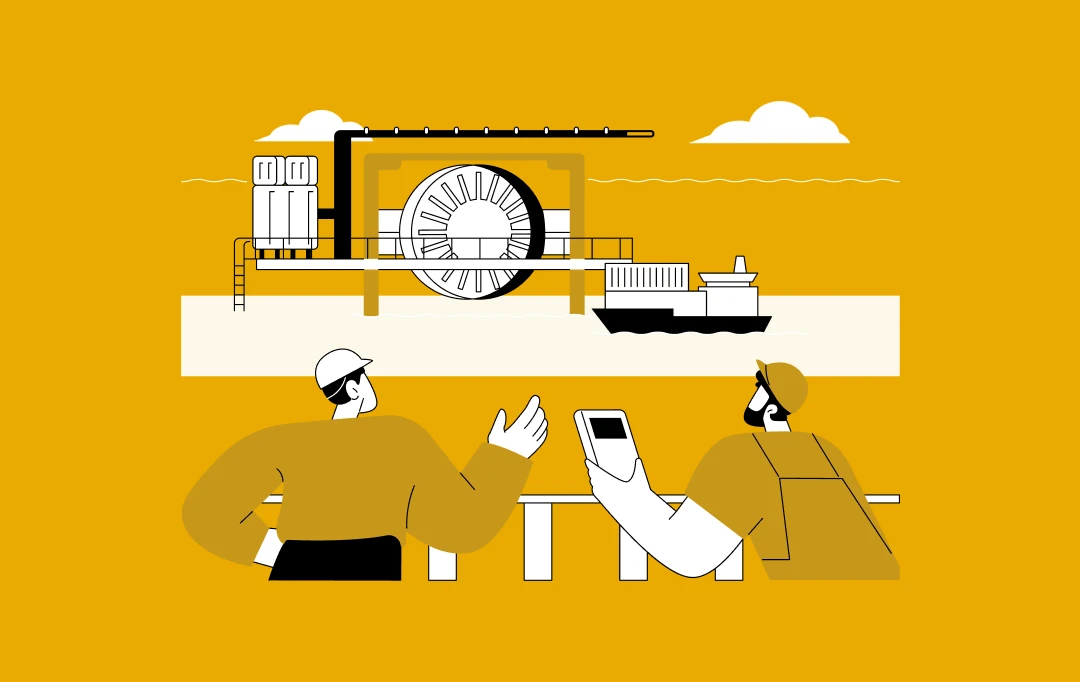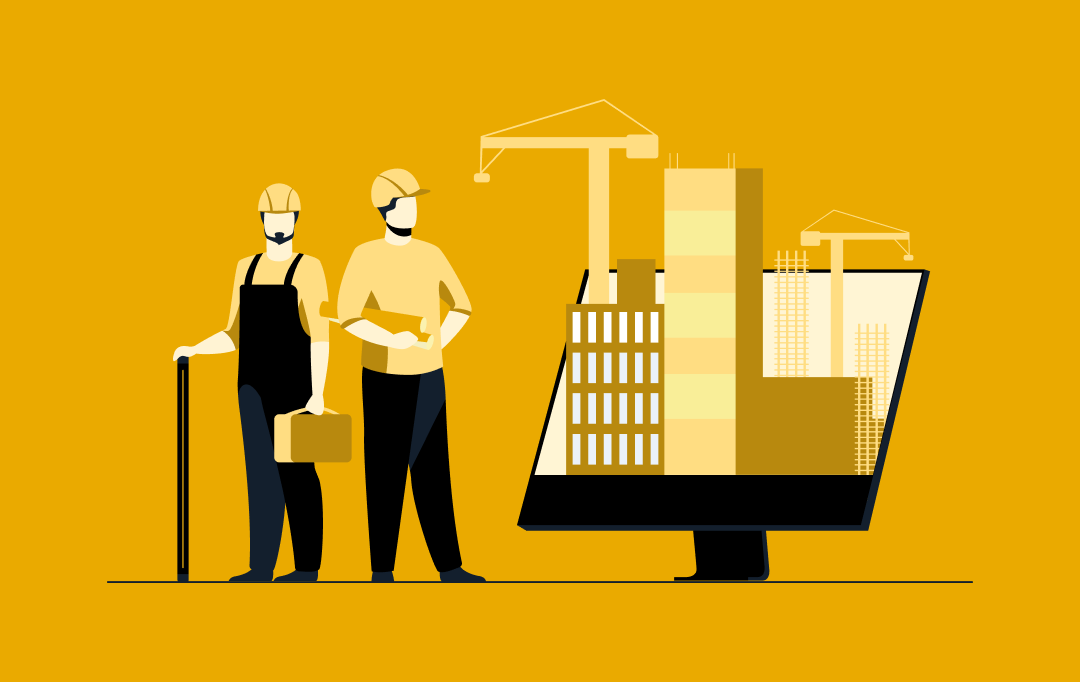- What is Digital Transformation in Construction? And Why Does It Matter?
- Benefits of Digital Transformation in the Construction Industry
- Enhanced Efficiency
- Improved Accuracy
- Increased Safety
- Better Collaboration
- Sustainability
- Customer Satisfaction
- Use Cases and Examples of Digital Transformation in Construction Industry
- Bid Management Software
- Construction ERP Platforms
- Jobsite Management Software
- Construction CRM Software
- Client and Customer Portals
- Material Takeoff Software
- HR Software
- Key Technologies Enabling Digital Transformation in Construction
- Challenges of Digital Transformation in Construction
- High Initial Costs
- Resistance to Change
- Integration with Existing Systems
- Data Security and Privacy
- Skilled Workforce
- How to Initiate Digital Transformation in Your Construction Business?
- Assess Current Processes
- Set Clear Objectives
- Choose the Right Technologies
- Plan for Integration
- Implement in Phases
- Monitor and Adapt
- Foster a Digital Culture
- How Appinventiv Can Help Initiate Digital Transformation in Your Construction Business
- FAQs
The construction industry, traditionally slow to adopt new technology, is now actively embracing digital transformation, marking a significant shift towards modernization and increased productivity. This change is all about adopting new solutions that enhance efficiency, safety, and project management, offering significant benefits to businesses. While the complexity of construction projects and coordination among multiple parties has previously affected digital adoption on a global scale, solutions like Building Information Modeling (BIM), AI for project management, and IoT devices for site monitoring are actually turning out to be game changers.
The integration of these technologies is delivering tangible benefits to businesses in this evolving ecosystem. They enable better management of projects, improve decision-making through enhanced data analytics, and improve safety protocols. In addition to this, these digital solutions are also streamlining communication and collaboration across various project stakeholders, reducing the common delays and errors that impact timelines and costs.
In this evolving landscape, a recent McKinsey report highlights a notable rise in digital technology investments in the construction sector, backed by economic forces, regulatory updates, and tech advancements. This increase in digital adoption is revolutionizing project management and delivery, marking a shift toward more advanced digital solutions across the industry.
For businesses, digital transformation in construction is a shift that is expected to go beyond just adopting new technologies and will allow them to foster a culture that embraces digital change. Businesses that successfully adopt these technologies will not only improve their project outcomes but also set themselves up as leaders in a rapidly evolving industry.
In this blog, we will explore how embracing digital transformation can not only streamline operations but also unlock new opportunities for growth and innovation in the construction sector. So, let’s dive into the future of construction, where digital prowess will pave the way for building excellence.
What is Digital Transformation in Construction? And Why Does It Matter?
Digital transformation (DX) in construction refers to the integration of digital technologies into all areas of the construction process, from planning and design to execution, management, and more. This transformation is rather vital for businesses as it paves the way for increased efficiency, improved accuracy, and enhanced communication, fundamentally changing how projects are delivered.
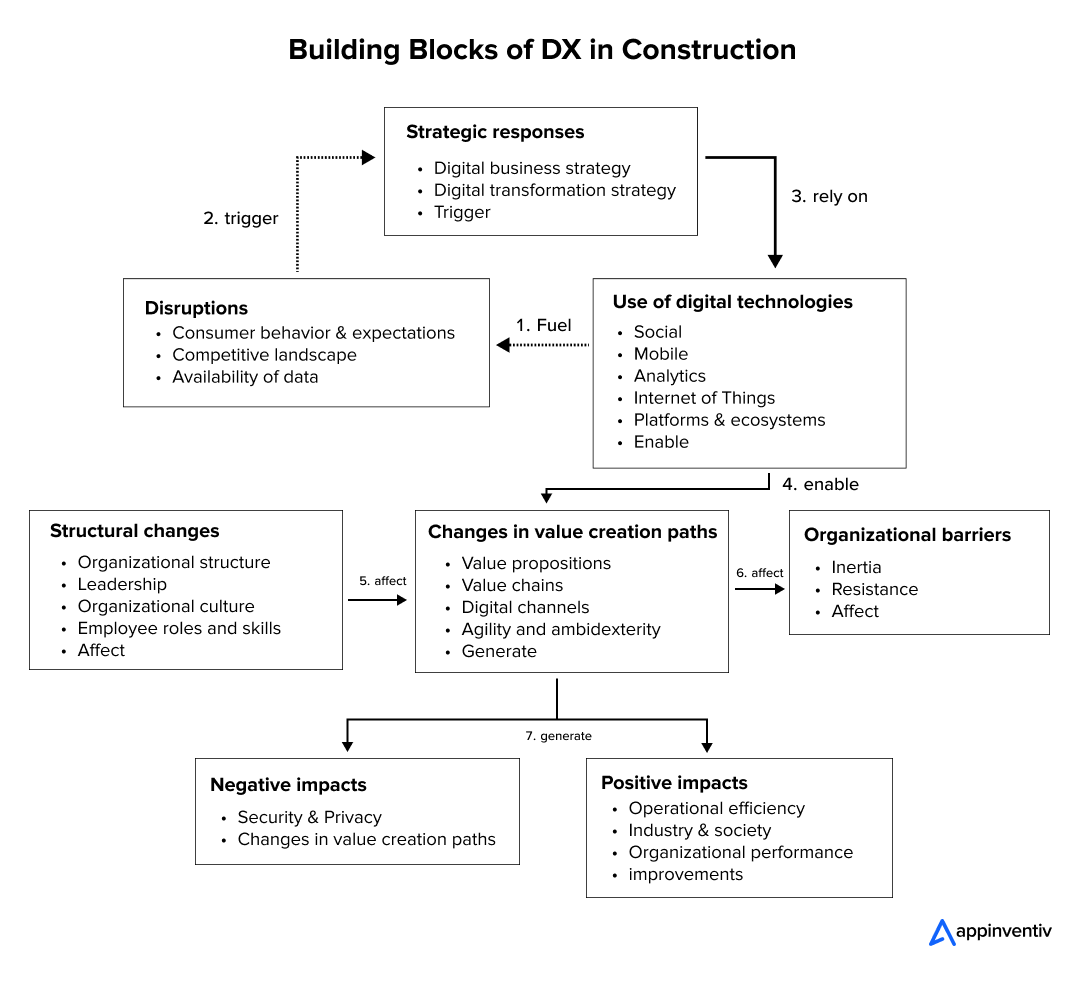
In addition to this, the adoption of digital technologies such as cloud computing, AI, and IoT devices enables real-time data collection and analysis, which can significantly streamline project workflows and decision-making processes. It also allows for greater precision in tasks like cost estimation, risk assessment, and resource allocation. These advancements lead to more predictable outcomes and can drastically reduce the time and cost associated with traditional construction methods.
According to a recent Deloitte report, named State of Digital Adoption in the Construction Industry 2024, there has been a significant shift toward digital transformation within the construction sector. Nearly 1,000 businesses surveyed show a robust adoption curve, with 68% already using or planning to implement AI technologies to navigate market disruptions and enhance operational efficiency.
Businesses that have invested in new technologies have seen promising financial returns, with an average increase of 1.4% in revenue growth and 1% in profit growth. This movement towards digital solutions is not just about keeping pace with technological advancements but also about leveraging them to improve project outcomes and financial performance in a competitive market.
For instance, a global firm like Vulcan Materials has effectively harnessed digital transformation to revolutionize its operations. The company has embraced a range of digital technologies, from cloud-based solutions to sophisticated data analytics, to modernize its infrastructure and overhaul its IT strategies. This has not only optimized the firm’s operational processes but has also significantly enhanced its market competitiveness, leading to more efficient project delivery and improved profitability.
In addition to this, the most famous construction firm, John Holland has even started employing Gen AI solutions in its workplace to enhance productivity and witness significant other benefits. .
Simply put, the digitalization in the construction industry is not just a trend but a strategic necessity. Let’s move ahead and look at the multiple benefits of digital transformation in construction, exploring how these technologies are improving current processes and opening up new avenues for innovation and growth in the industry.
Benefits of Digital Transformation in the Construction Industry
Digital transformation in the construction industry paves the way for a significant shift towards more efficient and innovative practices. By integrating advanced technologies, companies are redefining how projects are managed from the very beginning. Let us look into the specific benefits that digital transformation brings to the construction sector.
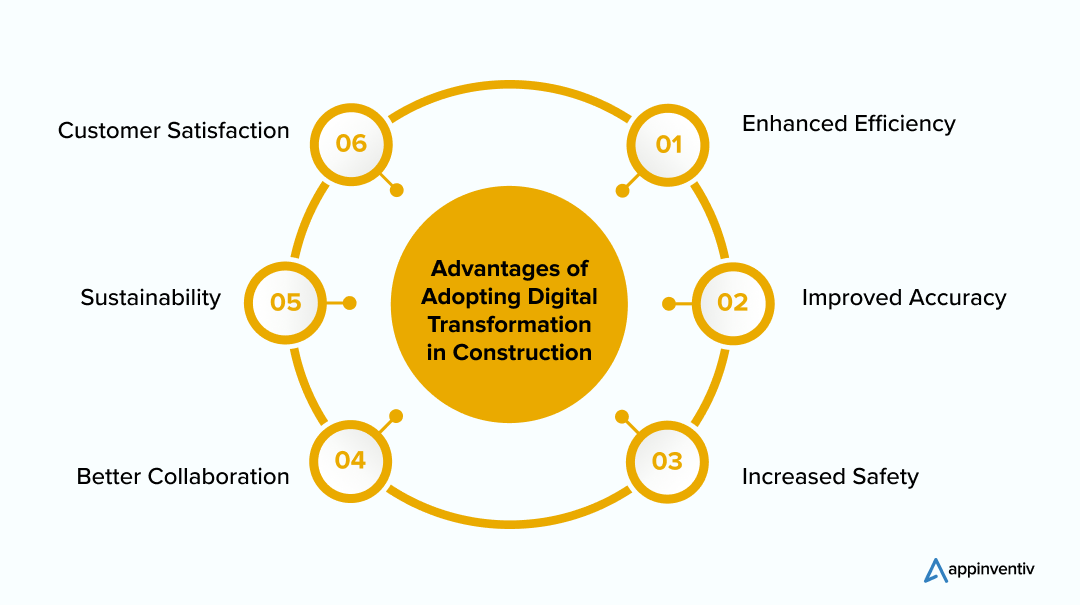
Enhanced Efficiency
Digital solutions like Building Information Modeling (BIM) and project management software helps in real-time planning and monitoring. This reduces the overall delays and helps in keeping the projects on schedule and within budget. These software solutions further automate many tasks that were previously manual, speeding up the construction process significantly.
Improved Accuracy
Overall improved accuracy is one of the major benefits of digitalization in the construction industry. Advanced analytics and design software helps in improving the precision and accuracy of everything from measurements to cost estimations. This minimizes the overall errors and the need for rework associated with the projects. Accurate data collection and analysis also assist in better resource allocation and logistics planning.
Increased Safety
Solutions such as AI-powered surveillance software and IoT-powered monitoring equipment can predict and prevent accidents on site. In addition to this, wearable technology can also ensure workers are monitored for health parameters to prevent fatigue-related accidents.
Better Collaboration
Digital platforms enable seamless communication among architects, engineers, contractors, and clients. In addition to this, cloud-based systems also have the ability to ensure that all stakeholders have access to the same information, updates, and documentation, reducing the overall misunderstandings and conflicts.
Sustainability
Sustainability is one of the major benefits of digital transformation in construction. Digital software and apps can help track the environmental impact of a construction project in real-time, making way for adjustments to be made at the right time, reducing the waste and energy consumption. Furthermore, more accurate tools and simulations can lead to buildings that are more energy-efficient and better adapted to their environment.
Customer Satisfaction
With the help of AR/VR, clients can visualize the end results before the actual construction begins. This ensures that the final product aligns with their expectations and reduces the chances of costly changes later on.
Use Cases and Examples of Digital Transformation in Construction Industry
The construction industry is increasingly leveraging digital solutions to enhance project management, efficiency, and overall operational well-being. Let’s take a closer look at some of the transformative solutions being implemented:
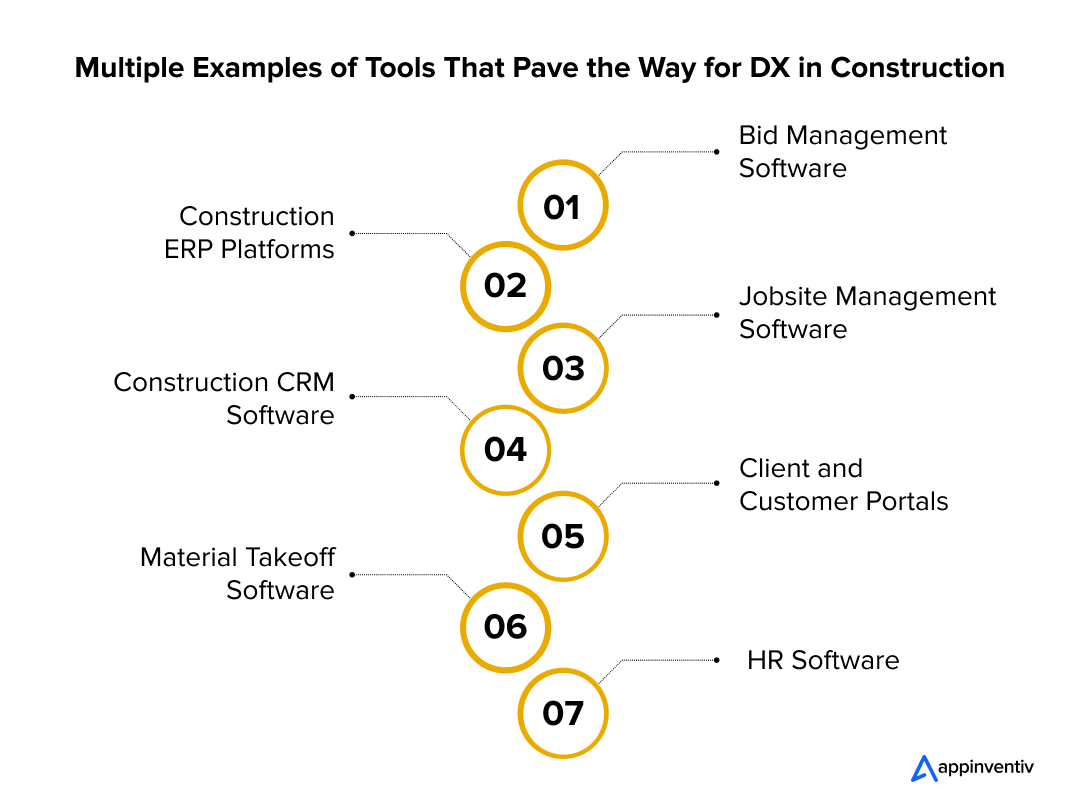
Bid Management Software
Bid management software development simplifies the bidding process, allowing for better collaboration and more accurate proposals. For instance, platforms like these integrate data across bids to optimize resource forecasting and minimize labor wastage.
Construction ERP Platforms
Enterprise Resource Planning (ERP) software is capable of paving the way for easy digital transformation of the construction industry. ERP systems in construction are capable of handling various functions such as project management, HR, and accounting. This integration facilitates better data visibility and decision-making.
Jobsite Management Software
This software is one of the examples of digital construction management solutions that enhances daily activity logging, inventory tracking, and document management. Furthermore, they help in improving communication among project teams by linking project items directly to communication threads, ensuring everyone has access to the latest information.
Construction CRM Software
CRM systems in construction help manage client and project data, streamlining engagement processes. Custom CRM solutions further help in synchronizing team interactions and updating data across multiple software, enhancing team efficiency and client service.
Client and Customer Portals
Client and customer portals in construction serve as digital platforms, providing real-time updates on project milestones, documentation, and progress. These portals enhance transparency and build trust by giving clients direct access to the latest updates and enabling them to track the status of their projects.
Material Takeoff Software
Material Takeoff (MTO) software is one of the most common examples that can help businesses understand the impact of digital transformation in the construction industry. They automate the process of quantifying and estimating the materials needed for construction projects. By using digital blueprints and specifications, MTO software accurately calculates the necessary materials, helping to avoid costly overages or shortages.
HR Software
In the construction sector, HR software systems streamline human resource management specifically tailored to the industry’s unique needs. These platforms facilitate the automation of key HR processes such as recruiting, onboarding, and employee management through sophisticated software tools.
Key Technologies Enabling Digital Transformation in Construction
The adoption of digital technologies in the construction sector is revolutionizing how projects are managed and executed. Here’s a look at some key technologies that are driving this transformation and setting the stage for future trends of digital transformation in construction:
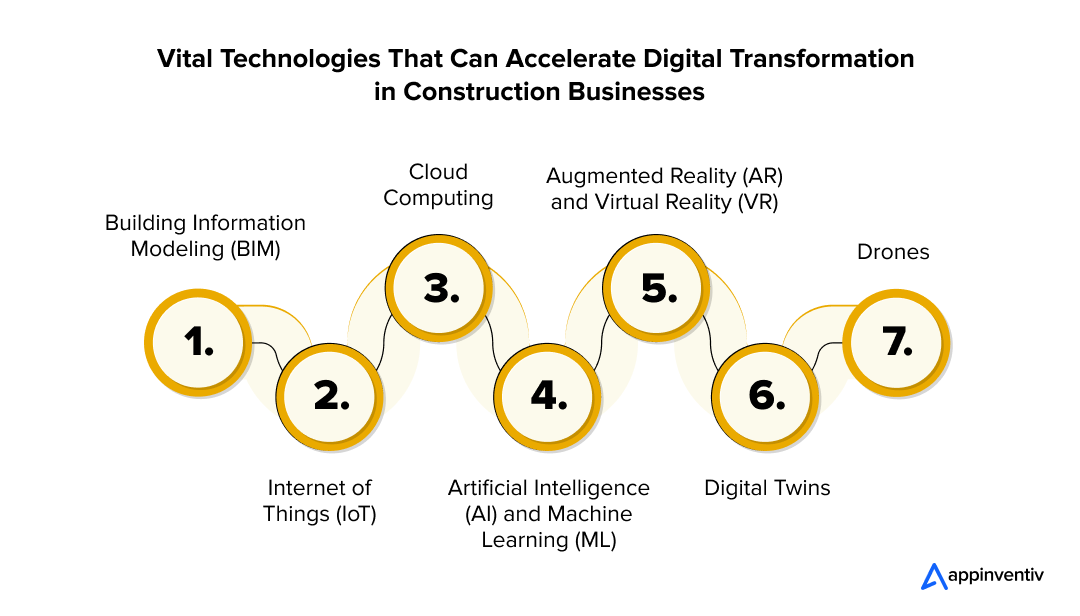
Building Information Modeling (BIM)
BIM is a digital representation of physical and functional characteristics of a facility. It paves the way for more collaborative and efficient project management and execution.

Internet of Things (IoT)
IoT devices collect data from construction sites in real-time, helping the employees to monitor the equipment health, environmental conditions and more. This helps in increasing the overall safety and operational efficiency.
Cloud Computing
Cloud platforms facilitate the storage and sharing of large datasets, improving collaboration across various stakeholders and reducing data silos.
Artificial Intelligence (AI) and Machine Learning (ML)
AI and ML in construction are being used to predict project risks, optimize schedules, and enhance decision-making. This helps in more efficient operations.

Augmented Reality (AR) and Virtual Reality (VR)
AR and VR technologies are used to visualize project blueprints in 3D, train employees, and enhance the client presentation experience.
Digital Twins
Digital twins in construction help in creating a virtual replica of a physical building to simulate, predict, and optimize the systems and processes by analyzing data from sensors installed on the physical building.
Drones
Drones are used in construction projects for surveying, monitoring construction sites, and accessing hard-to-reach areas. They help in ensuring comprehensive project oversight and enhanced safety.

Challenges of Digital Transformation in Construction
Digital transformation in the construction industry offers significant benefits, but it also comes with its share of challenges. Let’s look into some of the common obstacles faced by businesses and how they can be resolved:
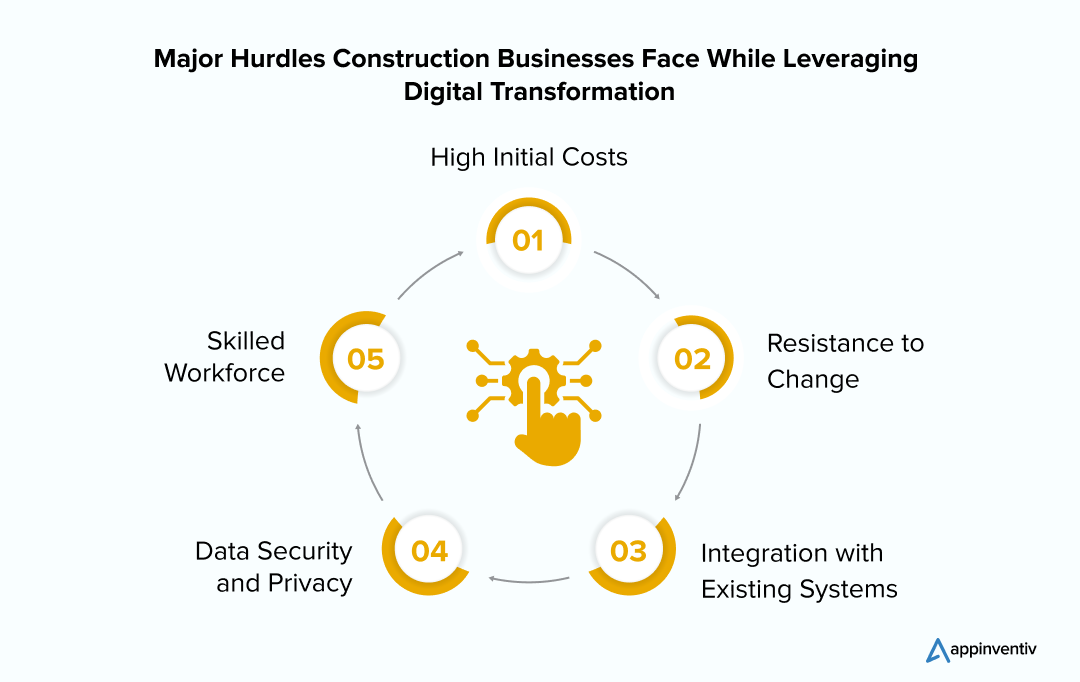
High Initial Costs
For some businesses, adopting new digital software or apps can be expensive, requiring significant upfront investment in employee training, hardware costs, and more.
To mitigate these costs, businesses can go for phased implementation of digital transformation in construction and explore various financing options. This includes subscribing to software as a service (SaaS) to spread out expenses over time.
Resistance to Change
For some organizations, there is often resistance from staff who are accustomed to traditional methods and may be reluctant to adopt new technologies.
To help manage this resistance, it’s beneficial to conduct comprehensive training sessions to familiarize staff with the new technologies and clearly communicate the benefits. Engaging with the changes and talking about it within the organization can also help facilitate smoother transitions.
Integration with Existing Systems
Integrating new digital solutions with existing systems can be complex and time-consuming, potentially disrupting ongoing operations.
To ease integration and promote a seamless digitalization in the construction industry, businesses can choose software that is compatible with existing systems or invest in middleware that facilitates communication between old and new software platforms. This strategic approach can reduce downtime and enhance efficiency.
Data Security and Privacy
Increasing the use of digital software or apps heightens the risk of data breaches and privacy issues, which can jeopardize sensitive information.
To protect against these risks, implementing stringent cybersecurity measures, conducting regular security audits, and training employees on data security practices is rather crucial. This can help in ensuring compliance with regulations and safeguarding the company data.
Skilled Workforce
The construction industry often faces challenges due to a shortage of professionals trained in the latest digital technology in the construction industry.
To overcome this, businesses can partner with dedicated software development firms that specialize in the construction industry. These partnerships can provide access to expert teams who are already skilled in the latest technologies, thus there won’t be any immediate need for extensive internal training.
Such collaborations can also facilitate the custom development of digital construction management solutions tailored specifically to the company’s needs, enhancing operational efficiencies and innovation capabilities. This strategic approach can help fill the skill gap and also accelerate the digital transformation process.
After looking into the major digital transformation challenges in the construction industry, let’s move ahead and look into the major technologies that are redefining the construction landscape.
How to Initiate Digital Transformation in Your Construction Business?
Embarking on digital transformation in the construction industry can be a game-changer, enhancing operational efficiency, improving project outcomes, and increasing competitiveness. Here’s how you can begin this transformative journey:
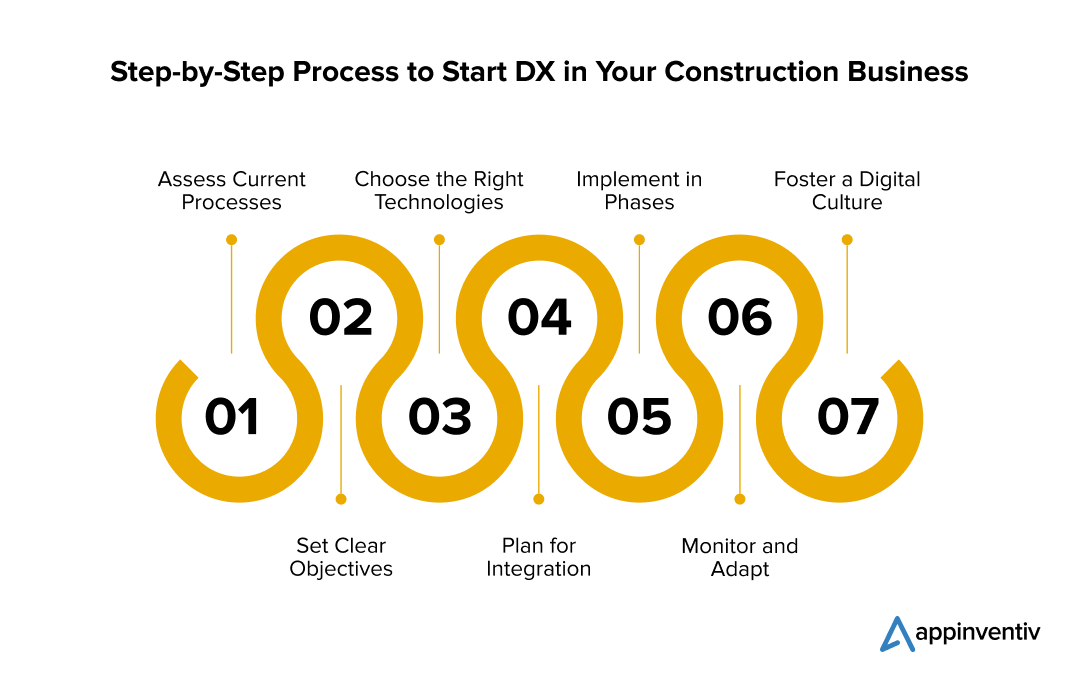
Assess Current Processes
Begin by conducting a thorough review of your current processes and systems. Identify areas where your business is facing issues, such as project management, procurement, or communication. Understanding the specific challenges your business faces will guide you in selecting the right digital solutions.
Set Clear Objectives
Define clear objectives for what you want to achieve with digital transformation. Whether it’s reducing project delivery times, decreasing costs, or improving safety standards, having specific goals will help measure success and keep the project on track.
Choose the Right Technologies
Research and identify the technologies that best suit your specific needs. For instance, in the construction landscape, you could go for BIM software that helps with better design collaboration, project management software to streamline operations, or IoT devices for real-time monitoring of equipment. Consider factors such as compatibility with existing systems, ease of use, and scalability.
Plan for Integration
Plan how these technologies will integrate with your current operations. This might involve upgrading IT infrastructure, training staff to use new systems, and setting up data migration strategies to ensure a smooth transition.
Implement in Phases
Roll out the new technologies in phases rather than all at once. Starting with pilot projects can allow you to manage risks and make adjustments as needed before full-scale implementation of digital transformation in construction. This staged approach helps to minimize the disruption and paves the way for learning and adaptation on a smaller scale.
Monitor and Adapt
Continuously monitor the results as new software is used by the employees or the stakeholders. Use the insights gained to make informed decisions about future enhancements or modifications. It is vital to understand that digital transformation is an ongoing process of improvement and adaptation is important.
Foster a Digital Culture
Encourage a culture that embraces change and innovation within your organization. Training and ongoing support for your team are crucial. In addition to this, open communication about the benefits and challenges of digital transformation is also necessary.
How Appinventiv Can Help Initiate Digital Transformation in Your Construction Business
Embarking on digital transformation is a big step for any construction company. Being a leading digital transformation company, we understand the challenges and specialize in crafting custom solutions that fit the unique needs of your business.
Whether you need better project management tools, improved data analysis, or real-time monitoring systems, we can design custom solutions that can guarantee to enhance your efficiency and meet your specific goals.
It is vital to understand that compliance with regulations is crucial in this business. As a dedicated construction software development firm, our team is skilled in building solutions that not only boost your productivity but also ensure you meet industry standards and compliances. This helps protect your business and builds trust with your clients.
Since adopting new technology can be daunting, our experts can guide you through every step of its integration into your business. From the initial setup to providing ongoing support, we are here to help ensure everything runs smoothly. Get in touch with us to make your digital transition smooth and beneficial, aiming for lasting positive impacts on your operations.
FAQs
Q. How is digital transformation shaping the construction industry?
A. Digital transformation is revolutionizing the construction industry by integrating technology into every aspect of project management and execution. This shift is enhancing efficiency, improving accuracy in planning and execution, and enabling real-time decision-making. By using solutions like project management software, cloud-based collaboration tools, and automated reporting systems, the industry is moving towards more predictable and streamlined operations.
Q. What are some of the major use cases of digital transformation in construction?
A. Key use cases that can help you understand the role of digital transformation in construction include automated project management, real-time resource tracking, enhanced safety monitoring, and improved collaboration through cloud-based platforms. These technologies pave the way for better risk management, cost control, and scheduling efficiency. In addition to this, the use of digital twins and advanced data analytics helps in making informed decisions throughout the lifecycle of a construction project.
Q. What is the cost of implementing digital transformation in the construction industry?
A. The cost of implementing digital transformation in the construction industry varies as per the overall scope and complexity of the projects. Typically, the costs of developing a software for streamlining your everyday construction tasks can vary from $35,000 to $250,000. In addition to this, the overall expenses of training staff to utilize these digital tools, and integrating them into existing operations can also add up to the existing initial costs.
While the initial investment in digital transformation varies, the long-term efficiencies, better project management, and lower error rates can provide substantial savings. Furthermore, to ensure these digital software or apps continue to operate effectively and securely, businesses may also have to incur ongoing expenses for software maintenance and updates.



How Digital Twins Act as Key to Smarter and More Agile Manufacturing Processes - 10 Use Cases and Examples
Tapping into the potential of digital twins in manufacturing, businesses today are creating a transformative virtual, real-time counterpart of physical systems, making it easier to monitor, assess, and optimize their manufacturing operations. McKinsey highlights the value of this approach, pointing out how “a company with a robust digital-twin platform can conduct comprehensive full-product simulations in…

How Digital Twins Are Driving Innovation in the Energy Sector - Benefits, Uses Cases and Real Examples
The energy sector, with its expansive growth and evolving demands, encounters a range of challenges, from aging infrastructure to operational inefficiencies and strict environmental regulations. As companies navigate these complexities, the need for innovative solutions becomes increasingly apparent. In this context, the digital twin technology emerges as a game-changing advancement, providing a sophisticated method for…
